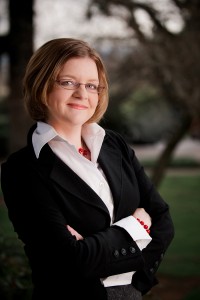Despite months of frustrating attempts to gather clear, linear financial data on the Columbia River Crossing Light Rail Tolling project, concerns raised by forensic accountant Tiffany Couch have no merit, according to a letter from Washington State Secretary of Transportation Paula Hammond.
Hammond, in a videotaped interview with The Columbian, also characterized Couch’s efforts as simply part of a detractor’s move to discredit the astronomically expensive project*, which is only in the planning stage and already hemorrhaging an average of $1.89 million every month**.
Hammond cited a Feb. 14 memo from David Dye, deputy secretary of transportation, and Bob Covington, director of financial services. The two said in the memo that they are “concerned by Ms. Couch’s report and public statements suggesting that the CRC (Columbia River Crossing Light Rail Tolling project) team has mismanaged the CRC project and that the project lacks accountability, transparency, and oversight. We found in our review quite the opposite, that in spite of very challenging circumstances the CRC team has conducted business in accordance with applicable policies, standards and guidelines and has steered the project to a successful completion of the Record of Decision.”
Among the assertions the memo makes in defense of the CRC process is that financial reports are regularly produced. However, when Couch originally reviewed the data, trying to reconcile expenses and income, a missing $15 million couldn’t be accounted for.

Tiffany Couch has not backed down from her efforts to get a clear financial accounting from the CRC.
Lack of best practices
The memo Hammond cites also said that review and oversight of CRC finances has been consistent with laws, accounts standards and procedures. Couch said she knows of no one outside WSDOT or the CRC who has examined their procedures, or any independent reviewer who has examined procedures on any mega-project anywhere.
“It is my belief that WSDOT probably follow the only practices they know of – the processes and procedures they’ve already had in place,” Couch said. “They probably are comfortable that they’ve followed their own procedures and are apparently quite proud of that. I can tell you they have not met GASB (Governmental Accounting Standards Board) best practices. Best practices in construction or engineering? Highly doubtful. We can’t even get reports.”
One of the major points Couch has hammered home is an apparent sweetheart deal given to David Evans and Associates. Dye and Covington said in the memo that out of $104 million invoiced so far by private companies contracted to provide a variety of professional services, testing and research, $98 million has gone to David Evans.
Couch also raised questions about why project task orders were cancelled, then restarted. “The explanation of this simply does not make sense,” Couch said. “If you were going to cancel out and restart – then why would you add tens of millions of dollars in change orders (i.e. spend so much money?) Where are the documents and communication that show how and when they came to that conclusion?”
Couch asked why supposed experts in the environmental impact statement process would need to cancel and restart. “Sometimes a part of a job is cancelled and restarted in construction – but an entire task order where you’ve already spent all this money? No way.”
Slow responses to public records requests
The memo also claims that responses to public record requests – specifically from Couch – have met state law. “This is simply untrue,” Couch retorted. “There is an exhibit in my report that clearly spells out their noncompliance with state law.”
She cited a July 19, 2011 email she received from Rick Phillips, director of administrative services at WSDOT, with the subject line “CRC Public Disclosure Requests.” In the email Phillips references four outstanding requests and says “When I checked on them I was embarrassed to discover that my staff received them from CRC on April 26 and they were apparently misfiled.”
Phillips goes on to “apologize for our non-responsiveness.”
In The Columbian interview Hammond adds that tolling has been a difficult sell in Washington, but says the “light rail conversation has come a long way in Clark County in the last 10 to 15 years.”
However, significantly over-inflated tolling revenue projections were cited in independent reviews by two analysts on behalf of the governors of Washington and Oregon. The two experts also expressed grave reservations about the scope of the project and outdated data used to plan it.
Couch added that she’s “pleased that WSDOT has taken the time to respond to my white paper and the comments I made during a legislative hearing in Olympia last month. When government responds to valid concerns, it is always a good thing.”
* The well-documented cost to taxpayers, if the CRC stays on budget, is $10 billion. This was established by the Cortright Report (PDF) which used data from an independent review panel hired by the governors of Washington and Oregon. (View the panel’s final report.)
**Figures gathered from the CRC by Couch show this monthly breakdown: July 2011 – $2 million, August 2011 – $1.7 million, September 2011 – $1.7 million, October 2011 – $2.1 million.
See our continuing coverage of the Columbia River Crossing Light Rail Tolling project.
Do you have information to share on the CRC? To respond anonymously call 260-816-1426. To allow your comments to be used on COUV.COM call 260-816-1429.










[...] Tiffany Couch, the forensic auditor stands behind her report. [...]
[...] Tiffany Couch, the forensic auditor stands behind her report. [...]